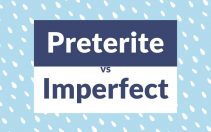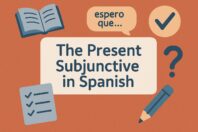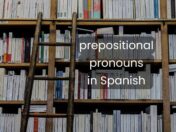Imperfect Subjunctive Spanish: Explained In Simple Terms

Get our free email course, Shortcut to Conversational.
Have conversations faster, understand people when they speak fast, and other tested tips to learn faster.
More infoThe Imperfect Subjunctive Spanish is one of the six subjunctive forms that exist in Spanish, and is used to expresses courtesy, desires, emotions, doubts, expectations or things that have not yet happened.
Ok. That’s probably a lot to take in right away, so we’ll go into more detail on this later.
But it’s worth noting that the imperfect subjunctive can be used to speak about actions connected to the past, or actions that have consequences in the present.
For example:
- I wanted you to spend the day with our parents – Quería que pasaras el día con nuestros padres
- If I lived closer, I would visit my parents more often – Si viviera más cerca, visitaría a mis padres con más frecuencia
We frequently combine the imperfect subjunctive with the conditional to build with if + simple past statements (similar to English).
For example:
- If I had more money, I would go to the concert this weekend – Si tuviera más dinero, iría al concierto este fin de semana
- If I were you, I wouldn’t worry about the exam results – Si fuera tu, no me preocuparía sobre los resultados del examen
Before continuing, there are two important things that you should know about the imperfect subjunctive.
- This form has an English equivalent, making it easier (for most students) to understand.
- This form can be conjugated using two different endings, both of which result in the same meaning.
Let’s deal with point number 2.
The imperfect subjunctive can be conjugated with two possible endings (e.g. viniera / viniese).
You don’t need to worry about why this is.
All you need to know is that these endings are interchangeable and mean exactly the same.
However, it’s still worth knowing both forms so that you can recognize when either is being used.
How To Conjugate The Imperfect Subjunctive Spanish
Before using the imperfect subjunctive, we need to know how to conjugate it in both forms.
A little trick to more easily remember the conjugation is to take the third plural person conjugation “they / ellos” in the simple past, better known as the Spanish preterite, as our basis to understand how to add two different endings (ra / se).
For example, below you’ll see the “they / ellos” conjugation for four verbs in the preterite.
| English subject | English simple past | Spanish subject | Spanish preterite |
| They | ate | They | comieron |
| They | ran | They | corrieron |
| They | wrote | They | escribieron |
| They | bought | They | compraron |
We will use those underlined words as our root for the imperfect subjunctive conjugation.
Now we can see how to build the conjugation using the following formula:
- Personal pronoun + third plural person (they) conjugation of the action verb in simple past + (ra / se) as follows:
To write / Escribir
Yo + “escribie” + “ra” or Yo + “escribie” + “se”
- She was surprised that I wrote her a letter – Ella estaba sorprendida de que le escribiera una carta
To run / Correr
Tú + “corrie” + “ras” or Tú + “corrie” + “ses”
- If you ran faster, you would catch up to me – Si (Tú) corrieras más rápido me alcanzarías
The above formula is a useful hack for remembering how to conjugate verbs in the imperfect subjunctive.
Now let’s go into more detail.
Regular AR verbs
Regular AR verbs can be conjugated by adding one of two endings (ra/se) to the root of the verb.
Remember, both endings result in the exact same meaning.
Over time, you might notice that one ending is used more in some countries than the other.
For example, the first conjugation (hablara, comiera, viviera) is more commonly used in Latin America than the second conjugation (hablase, comiese, viviese).
Below is an example of all conjugations for regular AR verbs:
| Personal Pronoun | Ending | Hablar (To talk) |
| Yo | ra / se | Hablara / Hablase |
| Tú | ras / ses | Hablaras / Hablases |
| Él / Ella | ra / se | Hablara / Hablase |
| Usted | ra / se | Hablara / Hablase |
| Nosotros | ramos / semos | Habláramos / Hablásemos |
| Ustedes | ran / sen | Hablaran / Hablasen |
| Ellos / Ellos | ran / sen | Hablaran / Hablasen |
Regular ER and IR Verbs
For ER and IR verbs, simply add an ” i ” in between the root and the endings we already know (ra / se)
This means, a verb like Comer (to eat), will be become: Comiera.
And with a verb like Salir (to go out), will be become: Saliera.
Now let’s take a look at some common regular verbs:
| Personal Pronoun | Comprar (To buy) |
Estudiar (To study) |
Abrir (To open) |
Escribir (To write) |
Beber (To drink) |
| Compra- | Estudia- | Abrie- | Escribie- | Bebie- | |
| Yo | Comprara / Comprase |
Estudiara / Estudiase |
Abriera / Abriese |
Escribiera / Escribiese |
Bebiera / Bebiese |
| Tú | Compraras / Comprases |
Estudiaras / Comprases |
Abrieras / Abrieses |
Escribieras / Escribieses |
Bebieras / Bebieses |
| Él / ella | Comprara / Comprase |
Estudiara / Estudiase |
Abriera / Abriese |
Escribiera / Escribiese |
Bebiera / Bebiese |
| Usted | Comprara / Comprase |
Estudiara / Estudiase |
Abriera / Abriese |
Escribiera / Escribiese |
Bebiera / Bebiese |
| Nosotros | Compráramos / Comprásemos |
Estudiáramos / Estudiásemos |
Abriéramos / Abriésemos |
Escribiéramos / Escribiésemos |
Bebiéramos / Bebiésemos |
| Ustedes | Compraran / Comprasen |
Estudiaran / Estudiasen |
Abrieran / Abriesen |
Escribieran / Escribiesen |
Bebieran / Bebiesen |
| Ellos / Ellas | Compraran / Comprasen |
Estudiaran / Estudiasen |
Abrieran / Abriesen |
Escribieran / Escribiesen |
Bebieran / Bebiesen |
Irregular Verbs
Conjugating irregular verbs requires you to change the root of the verb, and then add the endings we just covered.
Below are some of the most common irregular verbs:
| Personal Pronoun | Ser / Ir
(To be / To go) |
Estar
(To be) |
Poder
(Can) |
Querer
(To want) |
| fue- | estuvie- | pudie- | quisie- | |
| Yo | fuera / fuese | estuviera / estuviese |
pudiera / pudiese |
quisiera / quisiese |
| Tú | fueras / fueses | estuvieras / estuvieses |
pudieras / pudieses |
quisieras / quisieses |
| Él / ella | fuera / fuese | estuviera / estuviese |
pudiera / pudiese |
quisiera / quisiese |
| Usted | fuera / fuese | estuviera / estuviese |
pudiera / pudiese |
quisiera / quisiese |
| Nosotros | fuéramos / fuésemos | estuviéramos / estuviésemos |
pudiéramos / pudiésemos |
quisiéramos / quisiésemos |
| Ustedes | fueran / fuesen | estuvieran / estuviesen |
pudieran / pudiesen |
quisieran / quisiesen |
| Ellos / Ellas | fueran / fuesen | estuvieran / estuviesen |
pudieran / pudiesen |
quisieran / quisiesen |
Now that we know how to conjugate in the imperfect subjunctive, let’s further examine how to build sentences.
When Is Imperfect Subjunctive Spanish Used?
There are a couple of common situations or scenarios when the imperfect subjunctive is used.
We can categorize them into three main groups:
1. Subordinate clauses involving past actions:
- I didn’t expect that you would arrive today – No esperaba que llegaras/llegases hoy
- It was good that the students did the homework – Fue bueno que los estudiantes hicieran/hiciesen la tarea
- The doctor recommended that you ate fewer fats. – El médico recomendó que comieras/comieses menos grasas
In all of these examples, the past action is described in the indicative mood, and the relative clause action is in the subjunctive, because these latter actions are not facts, they’re just possibilities related to the main clause.
For instance, the first statement indicates that your arrival today was not expected, therefore, it belongs in the realm of possible or imaginary situations, hence the use of the subjunctive.
2. To express courtesy or politeness:
This form is also used to sound more polite when expressing a wish and/or desires, and normally includes verbs like querer, poder, and deber:
- The policeman would like to see your identification – El policía quisiera / quisiese ver su identificación
- Today could be a good day – Hoy pudiera / pudiese ser un buen día
3. With conditional “if” clauses:
In Spanish, we use the conditional tense in a similar way to the English “if”.
To do so you use the word “si”, similar to the affirmative “sí” (yes), but without an accent, which is how you distinguish them as different words.
In fact, subordinate clauses that start with “if” in English can be translated directly into the Imperfect Subjunctive tense.
You can think about this as a simple formula:
- Si + imperfect subjunctive + conditional
This structure establishes what condition has to be accomplished in order to obtain the results expressed by the independent clause.
The consequence or result is expressed using the conditional tense.
Let’s take a look:
- If I ate more healthy, I wouldn’t have health problems – Si comiera más saludable, no tendría problemas de salud
- If we went to Europe, we would visit the Eiffel Tower – Si fuéramos a Europa, visitaríamos la torre Eiffel
We also use this form to express imaginary ideas or assumptions, similar to the English expression “as if ”.
All you need to do is add “como” before “si”
As if – Como si
- You look as if you were sick – Te ves como si estuvieras enfermo
- Live your life as if it were the last day -Vive tu vida como si fuera el último día
Easy, right?
Let’s take a look at more examples:
- If I did the homework on time, I would have good grades – Si hiciera la tarea a tiempo, tendría buenas notas.
- We would be very happy if we had a dog – Seríamos muy felices si tuviéramos un perro
- If I spoke 5 languages, I would be a polyglot – Si hablara 5 idiomas, sería políglota
Practice: Imperfect Subjunctive Spanish
1. Querer
_____ irme de viaje el próximo mes (I would like to go on a trip next month)
2. Tener
Si _____ superpoderes, controlaría el clim (If I had superpowers, I would control the weather)
3. Venir
Me gustaría que _____ a la fiesta (I would like you to come to the party)
4. Estar
Si no _____ ocupada, te ayudaría con tu tarea de español (If I wasn’t busy, I would help you with your Spanish homework)
5. Llegar
El jefe no está feliz de que _____ tarde ( The boss is not happy that we were late)
6. Encontrar
Mi mamá está feliz de que _____ ese trabajo (My mom is happy that you found that job)
7. Querer
_____ ver ese vestido por favor (I would like to see that dress, please)
8. Hablar
Si yo _____ con los animales, sería muy feliz (If I talked to animals, I would be very happy)
9. Ser
El duerme como si _____ un bebé (He sleeps like if he were a baby)
10. Ser
¡Ojalá _____ navidad! (I wish it were Christmas!)
ANSWERS
1. Quisiera/quisiese irme de viaje el próximo mes
2. Si tuviera/tuviese superpoderes, controlaría el clima
3. Me gustaría que vinieran/viniese a la fiesta
4. Si no estuviera/estuviese ocupada, te ayudaría con tu tarea de español
5. El jefe no está feliz de que llegáramos/llegásemos tarde
6. Mi mamá está feliz de que encontraras/encontrases ese trabajo
7. Quisiera/quisiese ver ese vestido por favor
8. Si yo hablara/hablase con los animales, sería muy feliz
9. El duerme como si fuera/fuese un bebé
10. ¡Ojalá fuera/fuese navidad!



